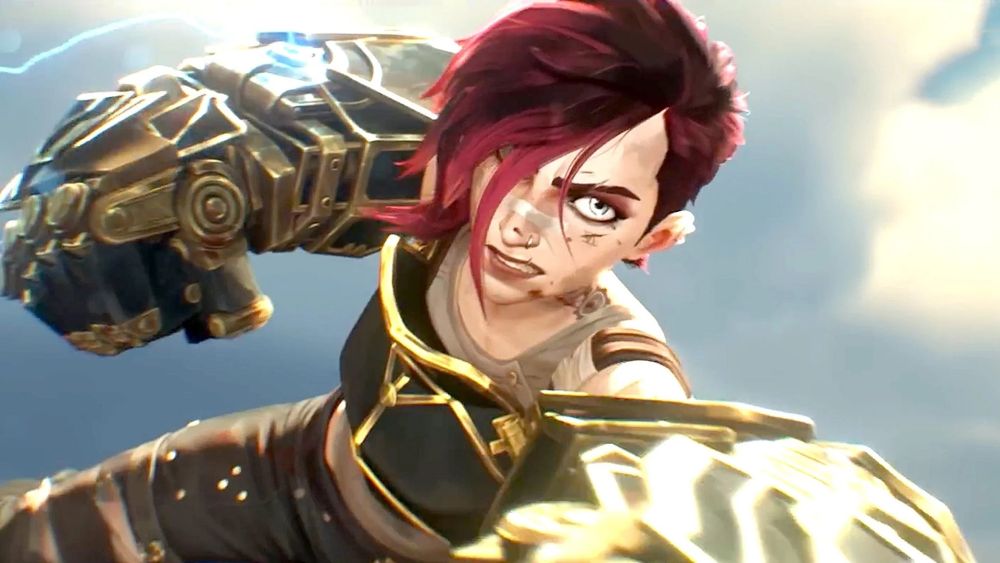 ★★★
★★★
“Everything that goes up, must come down again.”
Note: Watching season 1 or at least reading Jim’s review of it is highly recommended. Spoilers will follow!
I never played the MOBA (multiplayer online battle arena) video game League of Legends. But I guess this was the case for many people, when they discovered the first season of the animated series based on it in 2021 on Netflix, and were surprised by its great quality. For Arcane – League of Legends was a show long in the making. That it finally came to fruition is probably mainly due to the persistence of producers Christian Linke and Alex Yee. The whole project had many creative problems to overcome, not least the indifference of Hollywood, where Riot first tried, unsuccessfully, to find a partner for a possible translation of their stories into a film version. It would probably never have seen the light of day if they hadn’t employed producer and writer Amanda Overton. She was able to see the dramatic potential of Riot’s fictive world Runeterra and take the needed steps for this to become a story.
The whole project was something absolutely new for all involved, because animated clips for games are not the same as an animated series. It spent a long time in development – production for the first season took seven years. Success could not be guaranteed, therefore needing another three for the second season to go into production without finished scripts for every episode, according to Variety. This resulted in a total budget of $250 million for the entire series. The first season cost $80m to produce; the second, $100m; the rest went into marketing the first season. This means every episode cost $13.9 million, the highest budget per episode of any animated series ever.
Given that, it’s no surprise to hear the rumoured three further seasons are not happening. However, the producers say that was just an inside joke: it was always intended for the story of the twin cities Piltover and Zaun to be finished with the second season. At least, it’s what they claim. Watching the rushed events play out in season 2, with new, underdeveloped characters being introduced and old characters sometimes behaving inconsistently, and not necessarily in line with the way they were presented in season 1, make doubts about such statements absolutely justified.
In any case, here we go again! While normal watchers and fans had to wait 3 years for Arcane‘s second part. Season 2 continues its story immediately after the big bang, which we don’t get to see here, caused by Zaunite and gangster protégée Jinx, previously known as Powder. We get to discover which council members died and survived. That question seemed the most important one for many people, maybe only topped by the unresolved relationship issue between Jinx’s sister Vi and Piltoverian enforcer Caitlyn. Surprisingly, only half perished but Caitlyn’s mother, Cassandra, bit the dust, a potential catalyst for a revenge arc. But then, from the very beginning on, Arcane has followed much more complex storylines than your average Hollywood blockbuster.
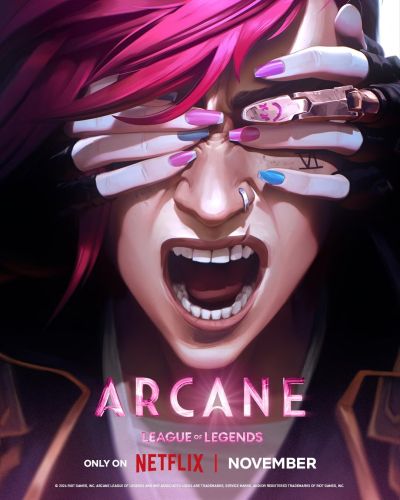 For this show, it means what would be enough for your average action movie or TV series, is just the beginning. It’s what I think makes the series above average in general. It always gives more than you asked for, and at the same time surprises you with sudden twists, unexpected developments, plus nuanced characterizations and relationships that escape standard black-and-white. Well, at least the first season did.
For this show, it means what would be enough for your average action movie or TV series, is just the beginning. It’s what I think makes the series above average in general. It always gives more than you asked for, and at the same time surprises you with sudden twists, unexpected developments, plus nuanced characterizations and relationships that escape standard black-and-white. Well, at least the first season did.
Characters are flawed, not just good or evil. They try their best, or at least react in a way that is human and understandable. Yes, the road to hell is paved with good intentions. Sometimes your effort to do good is exactly what leads to society’s downfall. That theme was prominent in season 1; for season 2, it’s also about how the actions and intentions of different people can clash with each other. Also, Riot and its creative team seek to put things on their head, with unforeseen developments for their characters. Viktor becomes a kind of helpful messiah in Zaun; Jinx teams up with her former gangster-stepfather’s loyal lieutenant Sevika, with whom she was at odds before, and young girl, Isha; Jinx becoming the poster girl for what seems to be Arcane’s prepared re-enactment of the French revolution; and Caitlyn is de facto declared sole ruler by Ambessa Medarda. A fallout between Caitlyn and Vi puts their developing love story on ice and drives Vi into nasty underground fights. There’s a lot happening here and a lot to unpack, too; no review can cover it all, so I won’t even try.
The dreamlike quality of the animation is still overwhelmingly beautiful. Though in some scenes and moments, you may feel you already know French animation studio Fortiche’s shtick. Anything repeated can hardly retain a feeling of originality, though it still may look beautiful. Once again, the musical score is fine and offers something for everyone. When music and visuals come together, they very often make a fine combination, reminding me of MTV music videos of my youth.
Unfortunately, the songs are usually at the beginning of each episode. I preferred it the way season 1 did it – we didn’t know when a song would pop up. It could be the beginning, middle or the end of an episode, so it was a nice surprise. Also, while the previous season had around eleven songs, here there might be twice as many. After a while, the constant interruptions of the story for another music sequence can start to feel quite a bit distracting if not outright annoying.
Is this season better or worse than season 1? It depends on what is important for you. What I liked very much of the first season, was it being character-focused and psychologically deeper than you would normally expect from your average entertainment product. Also, the realistic depiction of characters and their conflicts with each other made me buy into the more fantastic elements of the story. I got the strong impression that, in contrast to many Hollywood creators today, those in charge had actually read books on screenwriting and building dramatic conflicts, as well as believable characters.
Season 2 is different: focus appears to be elsewhere. It seems there is so much the writers feel the need to tell, and by wanting to introduce more of the game’s lore, it sometimes becomes too much for its own good. There are many new developments, arcs, characters, etc. Don’t get me wrong: characters are still likable, but they and their developing relationships had much more time to breath in the previous season. Here, things seemed to go a bit too quickly, and I couldn’t escape the impression characters were sometimes turning 180° within minutes. Very often events or explanations are kind of summarized in montages with music put underneath. Of course, you can do that. But you shouldn’t do it all the time.
A clear minus point in my book: things that felt logically had to happen based on season 1, are discarded in favor of other story decisions out of nowhere. You can say while the first season was character-orientated, the second wants to bring in boatloads of lore. Didn’t Jinx kill Sevika’s boss Silco just a day ago? And now they are teaming up? Really? A kiss finally confirms the love between Caitlyn and Vi, which can be probably counted as pure fan service for the lesbian community. But then there is a breakup a few minutes later, and Caitlyn, who was introduced as a shy and sexually unaware person in season 1, is shown in bed with fellow officer, Maddie Nolan. That’s a new character, and we don’t get any explanation why and how they became a couple. Where did that come from? How convenient it happened between episode 3 and 4, which saw another time-skip of unknown length.
The same is true for the revolution of Zaun against Piltover. It seemed to be just about to break out but is skipped over, too. Suddenly we have a Zaun held in check by Ambessa’s Noxian troops. I guess it relieved the animators from the burden of drawing extensive large battle scenes here between Enforcers, Zaunites and Noxian soldiers. All we get is a small demonstration led by Sevika, that’s immediately put down. Nor are we given an explanation why Jayce thinks that the Hexcore could save Viktor – how badly was he injured? While we can assume why Viktor leaves his friendship with Jayce behind, he never really states a specific reason.
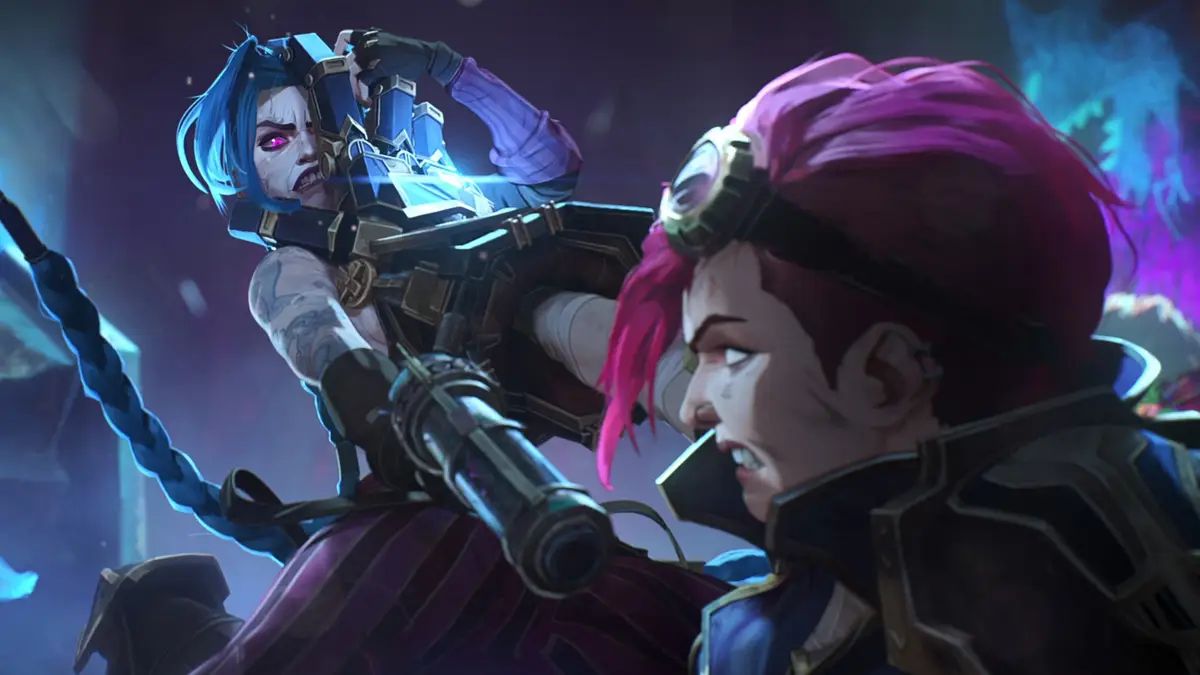 Why should the council accept Caitlyn as a new member, given she is only the daughter of Cassandra? Are political positions inherited in Piltover? If so, I’m not astonished the twin cities are having so many problems. Ambessa makes Caitlyn de facto commanding officer of the city and Caitlyn takes that position, only to backpedal an episode later. Why? If you want to tell an Emperor Anakin story, do so. But then go the full mile and show me her devastating actions, as well as the resulting impact. What is a story decision worth when you have no intention to make something out of it, and reverse it a couple of episodes later? It’s like starting to tell a story, then suddenly deciding against it.
Why should the council accept Caitlyn as a new member, given she is only the daughter of Cassandra? Are political positions inherited in Piltover? If so, I’m not astonished the twin cities are having so many problems. Ambessa makes Caitlyn de facto commanding officer of the city and Caitlyn takes that position, only to backpedal an episode later. Why? If you want to tell an Emperor Anakin story, do so. But then go the full mile and show me her devastating actions, as well as the resulting impact. What is a story decision worth when you have no intention to make something out of it, and reverse it a couple of episodes later? It’s like starting to tell a story, then suddenly deciding against it.
Other things didn’t make sense, as if the writers lost track of their own story. How come Ambessa knows Vi? She is virtually a total stranger to her. How does she know Vi and Caitlyn were close? And why should she be glad when Caitlyn fakes the capture of Vi, since she has little or no meaning for her? I do get that Linke & co. are in favor of “show don’t tell”, and prefer visuals and the intelligence of the audience to deduce things, instead of showering them in spoken info-dumps. But these things don’t appear logical anymore and demand explanations that are not given here. As someone who doesn’t know the game, I also had quite some problems understanding what was happening with the Hexcore, especially at the end.
Caitlyn in particular has a lot to answer for: she changes so often this season, that she could be called the poster child for inconsistent character writing. It’s as if the makers were preparing certain things, then didn’t want to follow through or got scared of their own boldness. Where is the bloody revolution, the big civil war that loomed all over season one, and whose ending seemed to be so unavoidable? I have to shake my head in disbelief at the storytellers, obviously preparing a love story between two main characters, only to chicken out for want of not having them come together too early, meaning they bond physically just shortly before the finale. Unfortunately, when said scene finally happens, it feels very much “too little, too late”. [Did they really do it on the floor of a dirty prison cell, while the climactic battle was simultaneously brewing outside?]
It should be noted that the series is not a Netflix product; Netflix was just offered the show as a distributor. Riot Games, its creator, financed the series themselves and had French animation studio Fortiche produce it. It might explain why the usual “propaganda” we see in a lot of Netflix-productions is less obviously present in this. This show mainly abandons lectures in favour of its narrative. Though it’s fair to stress the story is focused on strong, powerful women. Male characters appear either as weak and emasculated (Viktor, Salo, Heimerdinger, Caitlyn’s father), negatively portrayed (Silco, Singed, Marcus, Finn, Smeech), non-intimidating boyfriend material (Jayce, Ekko) or – and this becomes almost a dead horse – dead/absent father figures (Silco, Vander and Marcus).
If you are an imposing strong man, here it is usually as a supporting character without any agency of his own (such as “The Scowler”, Loris or Riktus, Ambessa’s muscular right-hand man). If you had told this story a few years ago, Jayce and Caitlyn would have become an adored couple – an idea the first season seemed to toy with for a moment, then quickly discarded. But as we live in ‘enlightened times’, the show sees the sensitive Jayce being seduced by powerful black leader Mel Medarda, and Caitlyn is revealed as a lesbian.
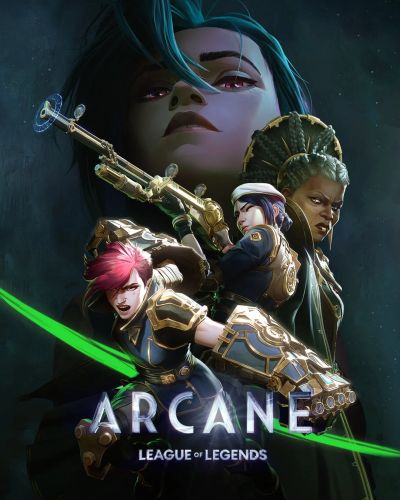 Disappointingly, the expected big final fight between Vi and Jinx is not to be found here: instead, they get along again after a bit of a brawl. Jinx the psycho? She seems quite normal again, after playing surrogate mother to the mute Isha for a couple of episodes. That’s far from any normal psychological reality. The screenwriters aren’t even above shamelessly milking nostalgia by giving us a flashback to Vander, Silco and the mother of Vi and Jinx sitting in “The Last Draw” – in a way it’s even repeated later again. Cheap, cheap, cheap!
Disappointingly, the expected big final fight between Vi and Jinx is not to be found here: instead, they get along again after a bit of a brawl. Jinx the psycho? She seems quite normal again, after playing surrogate mother to the mute Isha for a couple of episodes. That’s far from any normal psychological reality. The screenwriters aren’t even above shamelessly milking nostalgia by giving us a flashback to Vander, Silco and the mother of Vi and Jinx sitting in “The Last Draw” – in a way it’s even repeated later again. Cheap, cheap, cheap!
Certain developments feel hasty, rushed and insufficiently explained. If I didn’t look it up, I’d have no idea about the meaning of the Black Rose. Maybe the Ambessa novel coming out next year might make things clearer? Fans may know what this is about; but it’s not how you present a story to people who have no prior knowledge of the game’s lore. By doing things like this you essentially exclude them from the show. I will say, it becomes better in later episodes. Episode 7 function as some kind of alternative universe story, that works as a stand-alone. Episode 8 finally gives us information we could have used earlier, when the characters have some much needed discussions with each other. Unfortunately, the last episode opts for a finale akin to a typical Tolkien adaptation by Peter Jackson, with what appears to be the villain from Avengers 2: The Age of Ultron, and partly falls prey to esoteric mumbo-jumbo.
Also, newly introduced characters such as Isha, Loris or Mattie are never developed. What can we really say about them? What is the sense of introducing an admittedly cute little girl into the story, having her do or say little of significance, only to kill her off a few episodes later? Yeah, I know, it has shock value when a child dies. But “kill the cutie” is one of the cheapest cliches. I did not expect the makers would fall to the level of George R. R. Martin, after the screenwriting skills they demonstrated in season one. [But there might be a simple explanation: I read that four of the screenwriters in season one were not part of the writing committee for season two.] For me these things indicate a rushed, not thought through screenwriting process. Obviously having “only” three years for the second season, compared to seven for the first, led to a tangible loss of quality in the careful construction of scripts and characters.
The first season’s story built up, with logical progression, and you could quickly identify with the characters’ psyches and what drove them. Don’t get me wrong, the show is still very good and entertaining, but would have been much better served if this edition had more time to breath and been spread over two or maybe even three seasons, instead of just one. Too often you feel that there are scenes or needed explanatory dialogues missing, as if they had to be cut or were never written. Consequently, while I would easily have given season one 4 stars, season two lands with only 3.
Also, there is a slight change in style. While it’s still a drama, this season seems to skew a bit more horror-orientated. Body modification (see Viktor) plays a role here, as well as the frightening abilities of the “Hexcore”, which seems to develop like a living organism. We get enforcers hunting Jinx with gas into the deep mines, and unscrupulous scientist Singed creating Warwick, a kind of werewolf-ian monster, predicted by some LoL fans after seeing the last scene of season 1. The show as a whole gets more fantastic, compared to the more retro-SF leanings of the first season.
That said, the story arcs started three years ago are brought to an end, and that doesn’t necessarily mean a happy end for all. You have to deal with the new developments, regardless if you might have wished the show to develop in a different direction. The series is still the best in its specific genre – I guess that would be animated steampunk fantasy? – and market segment, though potential new competitors like Blue Eye Samurai are lurking around the corner.
Piltover looks very much Art Deco to me while Zaun is influenced by the style of Art Nouveau. I sometimes feel the twin cities remind me of a fantastic, retro-version of Paris at the beginning of the 20th century. Or maybe a bit earlier, around 1870 and the Belle Epoque – which makes sense, considering animation studio Fortiche has its headquarters in Paris. There is a clear commitment of Fortiche to artistry; there is hardly a frame that is not incredibly beautiful or fascinating. You could easily cover your whole living room wall with pictures of the show. Any complaints I have, are not about them: they did their work. They already are working on animated movie Penelope of Sparta (about Odysseus’ wife in Greek mythology). If it has half of the technical quality of Arcane, consider my ticket bought!
I liked season 2 but I didn’t love it. The action is still great, as are the visuals, in combination with a captivating soundtrack. You still care for the characters – though sometimes you just want to slap them right and left in the face, to get them to their senses or make up their minds. The show is complex and deals with modern but also timeless themes underneath its entertaining facade such as social injustice, the advantages and dangers of new technologies (if you want you can read “Hextech” as a metaphor for nuclear energy, environment endangering industrial processes in general, weapons of mass destruction, body modification or politics that are lead by economical interests only), and the corruption and ignorance that power creates.
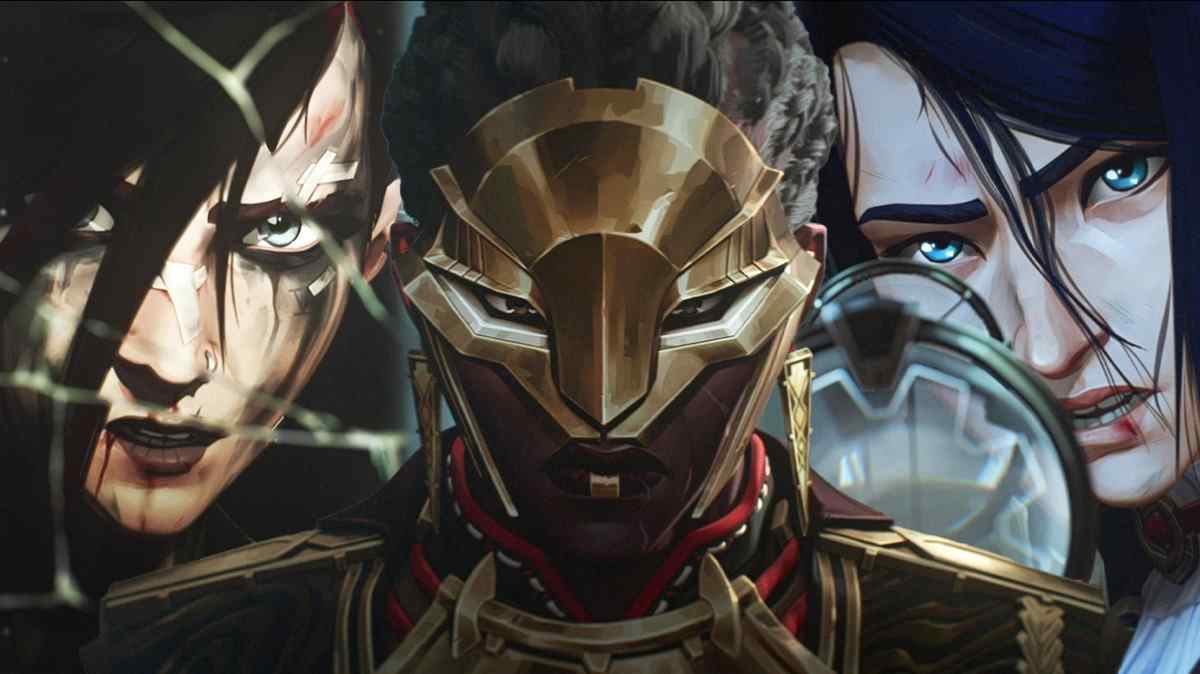 But there are also psychological and social themes of conflict: emotion versus intellect, safety versus liberty, preservation of the status quo versus progress by destruction of the existing system. These are best represented in sisters, Jinx and Vi, whose already shaky patchwork family has been torn into pieces by these battles. Yet it also shaped them, and put them on a collision course against each other. Or so it seemed, since the final confrontation is between Jayce and Viktor, while Jinx is given an unnecessarily bland, sacrificial death to save her sister – although the creators hint at the end that she may have survived. You could argue the character’s potential has been entirely wasted in the attempt to reshape her into a more positive protagonist in season two. I repeat: it feels absolutely weird. Looking at the titles of the first season I always expected the final fight to be between Jinx and Vi, and it feels like another broken storytelling promise.
But there are also psychological and social themes of conflict: emotion versus intellect, safety versus liberty, preservation of the status quo versus progress by destruction of the existing system. These are best represented in sisters, Jinx and Vi, whose already shaky patchwork family has been torn into pieces by these battles. Yet it also shaped them, and put them on a collision course against each other. Or so it seemed, since the final confrontation is between Jayce and Viktor, while Jinx is given an unnecessarily bland, sacrificial death to save her sister – although the creators hint at the end that she may have survived. You could argue the character’s potential has been entirely wasted in the attempt to reshape her into a more positive protagonist in season two. I repeat: it feels absolutely weird. Looking at the titles of the first season I always expected the final fight to be between Jinx and Vi, and it feels like another broken storytelling promise.
A minor complaint I have is, all these problems are shown, but a real solution isn’t offered for them. Yes, there are many good-hearted people here. who want the best for everyone, all fighting on different fronts, But in the end these eternal conflicts that mankind has suffered from since its existence are not really solvable. It’s kind of a downer when it comes to this original, very ambitious story. So, is season 2 what The Last Jedi was to The Force Awakens? Naah. It’s more what The Matrix sequels were to the first Matrix. Less a major disappointment than an unnecessary continuation of a perfect original. Honestly, I could have done without all the new fantastic elements and story arcs. I just wanted to see the resolution of the story the first season promised me.
Expectations set by the first season were maybe too high, but could have been at least partly fulfilled. The first gave us some kind of Greek tragedy in a fashionable modern dress, this feels more like just another fantasy show, with added modern “diversity”. The end of season one, though an open one, felt logical and justified. In a way, we could imagine the results of the final action and it didn’t really demand a sequel. The ending here feels kind of average and is unsatisfying as storytelling, perhaps partly due to already preparing another new show, probably set in Noxus. While still an entertaining series, the sad thing is that might be it for the time being.
While further TV and movie projects are planned, it appears the TV and film department of Riot has been disbanded and the team members moved to other departments in the studio, according to media reports. With a $3 million license fee per episode from Netflix and another $3 million from a Chinese distributor, do the math yourself. The show will not really be profitable, despite its popularity, though it may try to recover some costs from merchandise, the release of season one on Blu-Ray this year, selling skins for their game. But it has been reported, the best they can hope for is to break even, which is not a recommendable business model, understandably. Therefore, I’m quite astonished to hear producer Christian Linke talking about another project already in preparation since last year.
Personally speaking, it would be a shame if this is the last story we see from the League of Legends universe outside of the game. The screenwriters and producers would just have to be given enough time to develop something of a similar dramatic quality to season one. Focus on characters, not so much on lore. One story at a time is enough; we don’t have to know them all immediately. But who knows? Maybe one day it might come back due to popular demand, and because someone puts enough money on the table. Films of yesteryear (like right now: Gladiator) get sequels decades later, and TV shows I last saw when I was a hopeful 30-something return all the time. Why shouldn’t that be possible for this series, too?
Creators: Christian Linke and Alex Yee
Star (voice):Hailee Steinfeld, Ella Purnell, Kevin Alejandro, Katie Leung




